The United Arab Emirates Computer Emergency Response Team (AECERT) invited me as a guest speaker at a conference in 2011. A quick search through my email database indicates that my talk was on: “Critical infrastructure protection: the relationship between terror, cybercrime, and espionage”
That was in the early days of my disillusionment regarding government’s reactions to security: all they could think to do was weaponize it. I was starting to sketch together a moral equivalence between hacking and espionage, which have now become blurred together as a tool of authoritarian state-craft. I could probably dig up my talk but it’d be depressing – it’s the same stuff I spent the last decade of my career yelling about; it turns out that militarists only see shiny new weapons and never opportunities.
I flew over business class on Emirates Air, which is an amazingly nice airline – each passenger had a private cabin with an attendant who would bring food or booze in any combination. The booze service stopped when we were an hour out from UAE airspace, so everyone could sober up. Naturally I was amused that god’s “no booze” memo only applied where it was enforced by the hand of secular authority. Religionists like to postulate these all-seeing gods who are ignore-worthy chumps.
Deplaning, there was a Bentley waiting for me at the bottom of the jetway, and I sat in the back in exquisite comfort while the driver ran in to the customs-house (we bypassed the entire airport!) with my passport to clear me through. I began to realize that my hosts had mistaken me for being much more important than I actually am. It seemed churlish to disabuse them so I went along with it. The Bentley ran smoothly onto a closed-off freeway that allowed VIP traffic between the city and the airport. I am pretty sure I dozed off; the next clear memory I have was checking into the Ritz Carlton, where “everything is ready for you, sir” and the staff were bemused by my desire to haul my own luggage. It wasn’t much: a day bag and my black metal Halliburton briefcase, which probably screamed “spy!” to CIA fans everywhere.
Then we come to the penthouse suite at the Ritz Carlton. It was designed for someone much more important than I actually am. Someone with a retinue, or who likes to party. I was jet-lagged so I decided to take pictures of myself doing what I usually do (working on my laptop) in all the different venues around the suite. Seriously, since I exist mostly in cyberspace, I do not generally need all the amenities such as the huge living room:
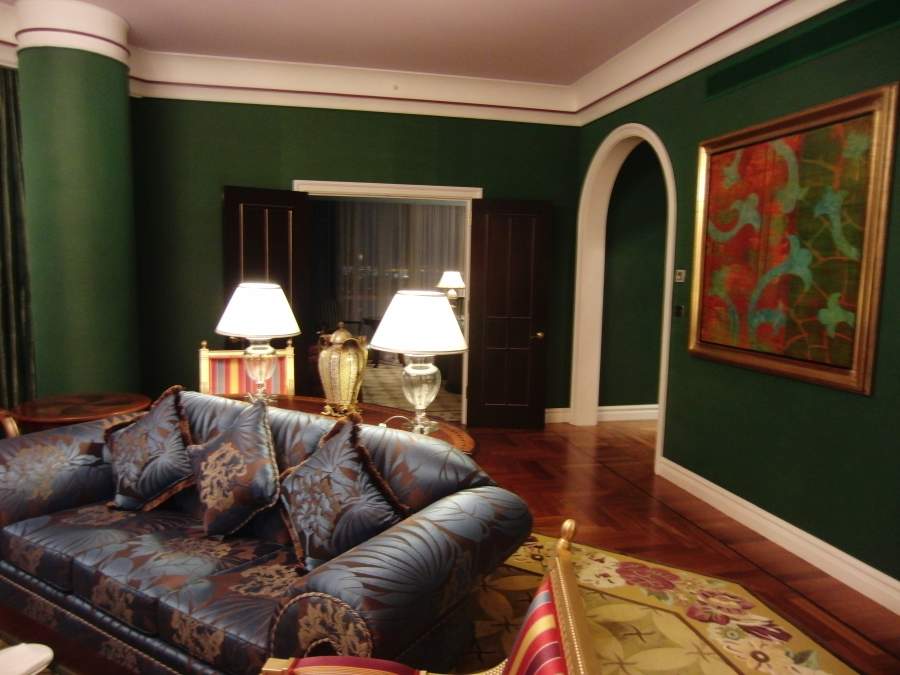
The bedroom was huge; the suite was several times the size of my house in terms of square footage.

There was a separate dining room, a walk-in closet the size of my bathroom and a bathroom the size of my bedroom at home.
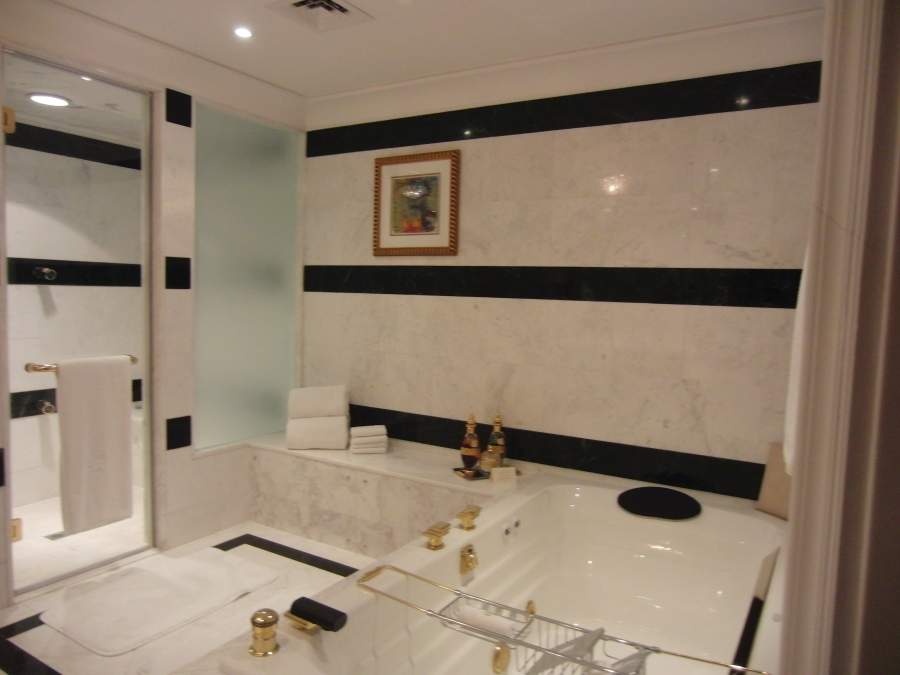
These pictures were shot with the mini camera on my Motorola Razr phone; I think it was 4 megapixels. The pictures are blurry as I felt.
The office was nice!
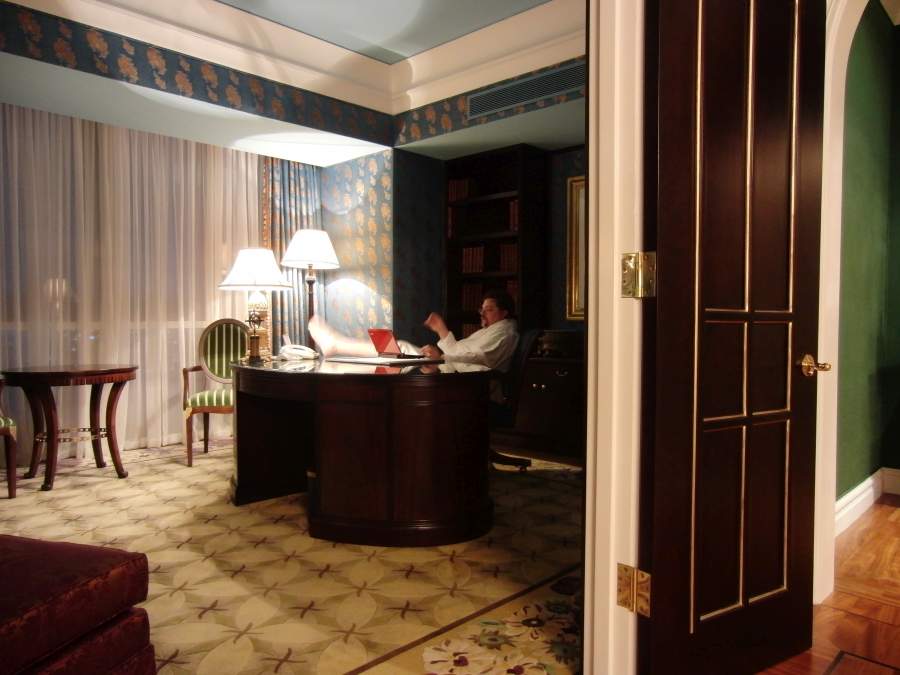
I had a dining room that seated 11, just in case.
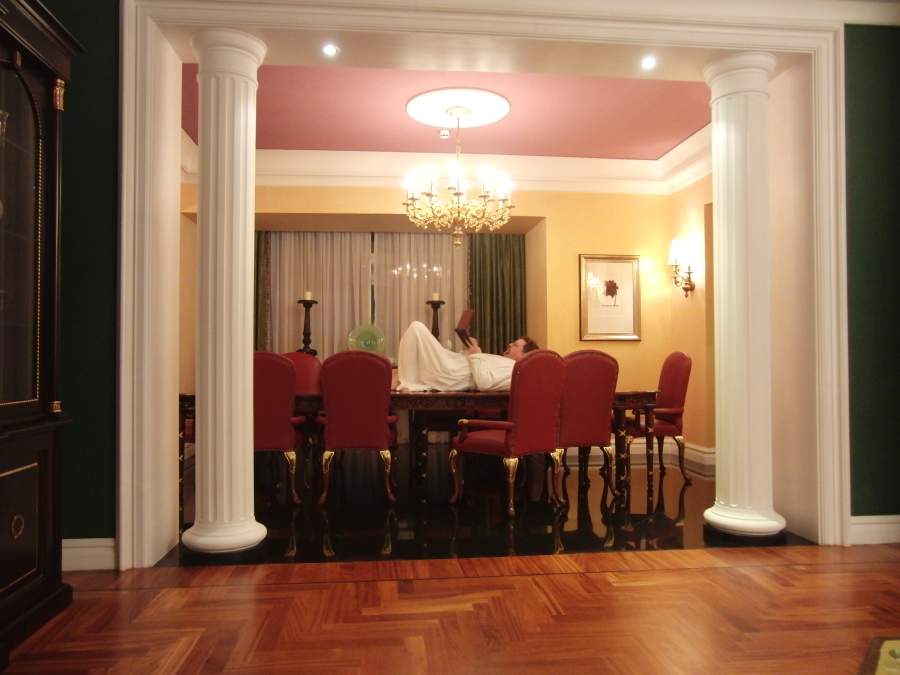
This is all well and good but I’d much prefer to have had the money that my nights in the suite cost someone. The flight cost something like $18,000 too, and I would have happily flown tourist class and pocketed the difference.
My parents always travelled like academics and bon vivants, with plenty of time built in to smell the roses. As a consultant and public speaker my life was run on a tighter schedule: I had to be there on time to do a talk or have a meeting, so I didn’t have much time other than “get from point A to point B, do the thing, then get to point C!” That meant that I was more or less immune to this sort of sybaritic lifestyle; I didn’t care if my bed was super comfy as long as it didn’t have bugs and was clean. I didn’t care if my shower was huge, just that the water was hot.
Sometimes I’d be somewhere for several days and I’d have downtime to tourist about a bit. In that case, I’d almost always head for a museum or take a walk to see what’s what. So, I saw some amazing things in Doha, I’ll admit.
The first thing that sunk in was that Doha is “Arab Disney” – there’s really not much there, so a great deal of money was spent creating an “old town” populated with “old stores” and merchants. I shot this at night so it’s a miracle any picture came out at all, but:

A lot of the architecture was constructed using cast concrete that had been aged. It was all high quality artifice but it was artifice, just the same.
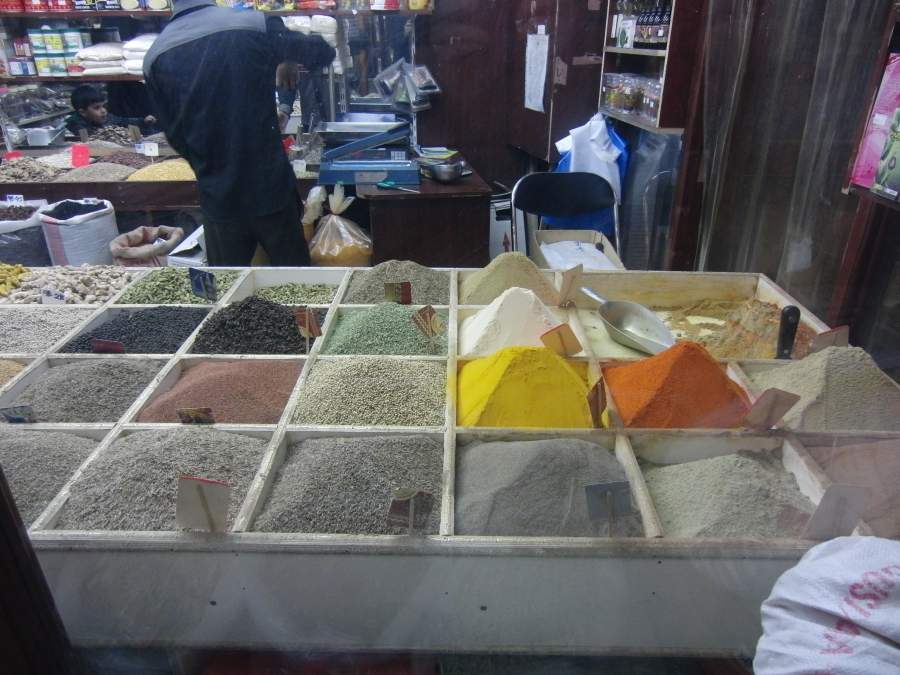
I was gobsmacked by the amazing scent of the spice merchant’s display.
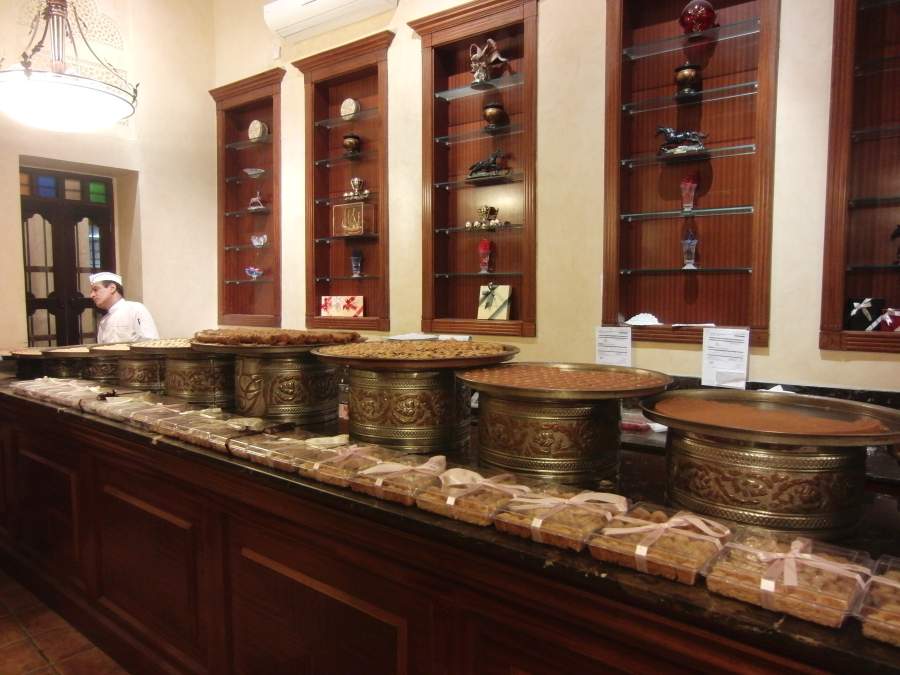
This store sold what appeared to be date pies, or pralines, or something.
My favorite part of Doha was a site that was, itself, a statement of what vast wealth can buy. The story I was told is that one of the wealthy rulers of the country decided there should be “culture” and wrote a check for a “cultural village” [wik] that would represent something about the history and culture of the place. There were also a lot of restaurants. And there was the ampitheater. I don’t remember the exact details but someone there told me that the ampitheater was made from imported stone – several massive boatloads of the stuff – cut and moved at tremendous expense.
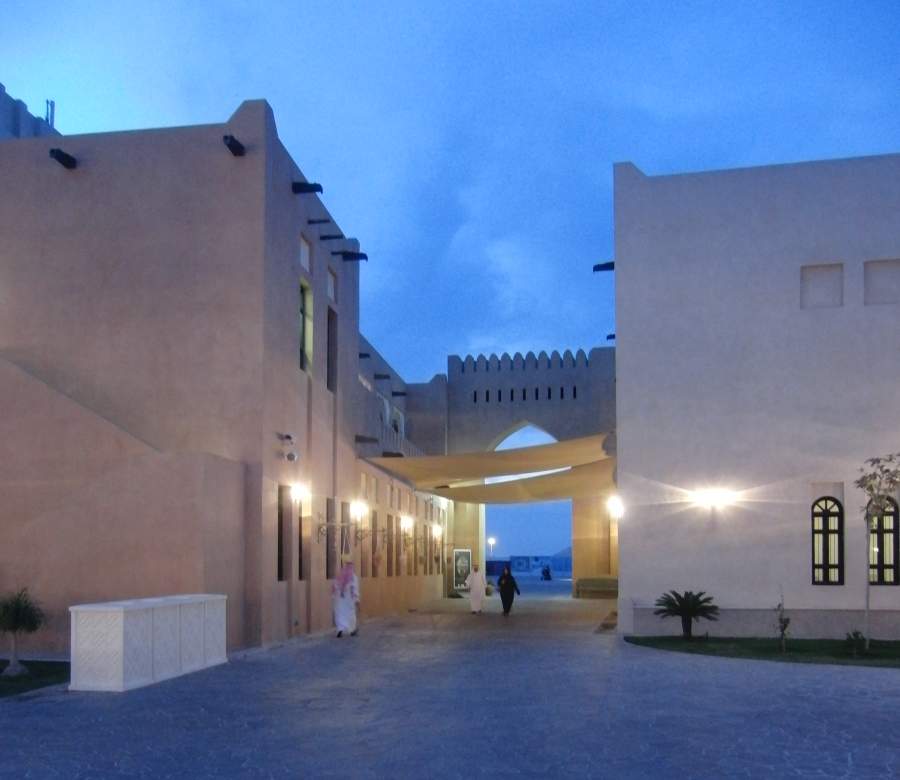
Look! it’s Fort Zinderneuf!
It’s a masterpiece of design. Since nobody was there I went down and climbed up on the stage, which is ever so slightly domed so that water will run off, and held a conversation with one of my fellow travelers who was all the way in the upper reaches. It’s simultaneously modern and old and it’s the kind of thing you just whip out your checkbook and write a check for, if you’re UAE royalty.
There is a really good photo (not taken with a camera-phone) on Alamy stock: [alamy]

All the world is a stage and we are merely players
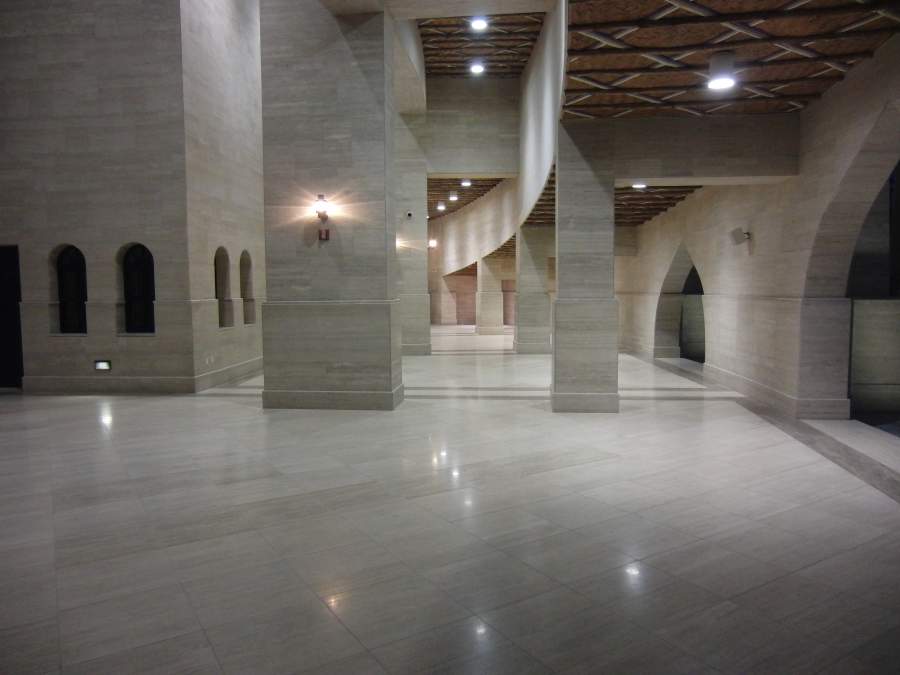
so much polished stone

look at the tired security guy

As if you weren’t being deliberately provocative by handcuffing it to your wrist.
That’s amazing. Those rooms are gorgeous… wow. I started thinking, how do the people who live there make a living when there are no tourists? Because if that’s a kind of “fake” city there would be no actual industry or resources for people to live there, without the tourism. Maybe the new industry could be solar energy? That is a stunningly beautiful construct, though. It is strange to see such a beautiful place with so few people.
kestrel@#2:
I started thinking, how do the people who live there make a living when there are no tourists? Because if that’s a kind of “fake” city there would be no actual industry or resources for people to live there, without the tourism. Maybe the new industry could be solar energy.
It’s all oil money for now.
I wondered at the time whether they have many performances in the ampitheater – it’s got to be pretty hot there in the summer. There’s nothing to keep the sun off the audience.
I suspect Aristophanes would have wept to see such a place.
For reasons I don’t know, the ampitheater connected in my brain with The Clash’s Rock The Casbah and now that place is forevermore what pops to my mind when I hear that song. Weird, huh? I’ve been to the great mosque in Istanbul, which is more the Casbah, but it’s not as pretty or as rockable. I would love to see Pink Floyd or Rammstein perform there…
I just realized that I must have chosen the wrong profession. Hmm, I wonder if there is a way how an artist can make a living by working as a conference speaker. /joke tag
Looking at images of this kind of real estate leaves me with mixed feelings. It’s immensely wasteful, in terms of environmental impact, heating (or air conditioning) bills, empty unused space, costs of upkeep, etc. I know that I wouldn’t even want to live in a place that is similar to this hotel. I don’t like being wasteful and inefficient with the resources I use. Mostly because I don’t want to feel like I’m trashing the planet any more than necessary. Simultaneously, I also look at how beautiful this place looks, and I feel envy. Whenever I travel, I regularly notice something nice that I would like—be it delicious-smelling food, or some artworks, or a beautiful hotel—I look at the price tag, and then I move on. Knowing that I will never experience this kind of luxury makes me envious. Overall, I’m very happy with my life, I don’t regret my career choice. I prioritize having lots of free time over high income; besides, being an artist is a pretty cool job. I intentionally chose a lifestyle that allows me to comfortably get by with as little money as possible so that I don’t have to work much. Yet, occasionally, when I see luxurious things, I feel envious of people who have access to them.
Yeah, me too. It’s not like I have ever been offered such luxurious accommodation, though. I always prefer to save costs on unnecessary luxuries, because this way I can work fewer hours.
It’s also amusing how Emirates Air employees, presumably religious people, are perfectly willing to serve you booze as long as you are outside of the UAE airspace. Does their god supposedly looks at people only as long as they happen to be located within the arbitrary geographical lines of some country?
How did the talk go?
“Does their god supposedly looks at people only as long as they happen to be located within the arbitrary geographical lines of some country?”
Look at the bizarre workarounds the Ultra Orthodox do to avoid breaking the Sabbath!
chigau@#6:
How did the talk go?
So-so. I pointed out a theme that I hammered on for over a decade, namely that governments were weakening security for everyone (even themselves!) in order to achieve transient advantages in cyberspace. In other words, they were ultimately building a world where cybercrime was going to be successful and terrorism would remain a plausible threat. That never used to go over well, because there were always those who promised to sell governments perfect security while being able to penetrate others at will. You can look at the world around us and I think you’d conclude I was right.
The actual talk went well but it was … interesting. I was the keynote. So I got ready and the time for the start came and went. After about 10 minutes someone ran over to me and explained that the prince who was funding the conference hadn’t managed to get into the building with his entourage, yet. About 5 more minutes and there was a big hullabaloo and about 50 people came crashing into the hall, and occupied a chunk of seats in the center. Then I was told I could start. So, I thanked everyone profusely for the opportunity to see their fair country, and launched into my talk. About 20 minutes in, one of the guys in the flock stood up and so did everyone else in the room. I stopped talking. I assumed it was the prince and sure enough, he walked out and his entire entourage swirled off with him. I finished my talk, but I could tell nobody was paying any attention at all.
There was a nice journalist afterward who explained that that’s normal and it was actually pretty cool that he showed up at all. And then they interviewed me and I said some plausible things.
Marcus @#8
What? People are supposed to be happy that some arrogant royal asshole acts in a way that’s disturbing, rude, and pretentious? I used to think that I cannot possibly hate royal families even more, but the more I learn about their behavior, the more I hate them.
So, whoever comes up with the most far-fetched and impossible marketing lies also gets to be the most beloved person around. And they also earn more money than everybody else. I can only assume that when it comes to computer security, there are no laws that ban misleading and deceptive marketing claims. (In other industries, for example medicine, there are at least some laws that forbid false and deceptive marketing claims.)
Well, thanks for this, Marcus. I don’t expect I will ever see such luxury first hand and I don’t really want to. I find such displays of wealth obscene and can only think about the great swaths of humanity that struggle for food, water, shelter and dignity.
Your photo of the spice market reminds me of the spice markets in Luxor. I was lucky enough to travel there in the 90’s and the markets were one of the best parts of the trip for me. The colours and smells were intoxicating.